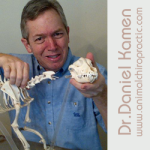
If animal chiropractic is new to you, the concept may sound a little strange. But many race horse owners swear that it’s helping their horses run better and faster.
According to Dr. Daniel Kamen D.C. this type of animal care isn’t a new concept, it has been around since about 1917. The American Veterinary Chiropractic Association has certified over 1,000 animal chiropractic professionals since 1989.
It’s not only race horses that benefit from chiropractic treatment. Cattle, sheep, pigs, goats, dogs, cats, birds and even reptiles can see improvements in spinal health.
How does animal chiropractic differ from chiropractic care for humans?
Chiropractic care offers much the same benefits to animals as it does to humans, says Dr. Kamen. And he should know. He’s been treating animals since shortly after he graduated from Palmer College of Chiropractic in 1981 and he’s written 3 best selling books on animal chiropractic technique, given seminars all over the world and has been mentioned by publications such as the Wall Street Journal.
How would you know if your animal needed chiropractic treatment?
Dr. Kamen says that if you notice that the animal cannot do something it used to be able to do, or if they’re doing things they don’t normally do, this is could be an indication that chiropractic adjustment may be helpful. He’s quick to caution that you should always seek your veterinarian’s advice first, in case there is a condition in which chiropractic is not advisable.
Some of the instances that would preclude chiropractic treatment include recent injuries, fractures, severe neurological problems or any three-legged lameness. You should never do an adjustment on a leg on which the animal cannot stand.
The first step in determining whether chiropractic adjustment is called for involves an assessment in which a range of static and motion tests are done while watching for pain avoidance.
Surprisingly, chiropractic care for animals is very affordable.
For a smaller animals, fees range from about $35 to $60, while for a larger animal, such as a horse, fees are in the region of $100 for a treatment. But it’s not always necessary to call in an animal chiropractor.
Dr. Kamen says that most owners can be taught the basics of how to perform simple adjustments on their own animals. He says that no great strength is required, simply precision and speed. He suggests having a certified animal chiropractor treat the animal a few times first and if the treatment is successful, the owner can then learn how to do the adjustments themselves.
While some of small animal adjustments are very similar to human adjustments, large animals do require slightly different treatment. For instance, In the case of horses, a herniated disc is an impossibility. The inside of a horse disc, known as the nucleus pulposus, is relatively dry compared to a human’s disc. Even if a horse’s disc is under pressure it can’t burst or rupture like a humans can.
Nor are horses likely to suffer from pinched nerves. The hole through which the nerve exits the vertebra, known as the intervertebral foramen (IVF) is so deep and rigid that it’s virtually impossible for a nerve to be pinched. Humans and small animals such as dogs, on the other hand, occasionally have a nerve pinched between adjacent vertabrae, or a nerve that’s under pressure from a disc.
Animal chiropractic is very safe.
With most chiropractic adjustments there is an extremely low risk of any damage being done and a very high probability that the animal will be helped. Dr Kamen warns that the use of an adjustment mallet on large animals is never necessary and raises the risk of injury. Most animal chiropractors no longer use this instrument on large animals.
Animal chiropractic is becoming an increasingly popular alternative to invasive surgery and drugs. It’s less traumatic for the animal, has no adverse side effects and is less costly in the long run.
There’s just one problem. Animal chiropractic practitioners, who are also licensed human chiropractors, are not allowed to practice in most of the states in America. In all but 4 states legislation prohibits certified animal chiropractic practitioners from treating patients. Only Nevada, Oklahoma, Minnesota and Colorado currently recognize A.V.C.A. certification.
It’s a frustrating example of out-of-touch bureaucracy and, in Dr. Kamen’s opinion, profit protectionism standing in the way of a vital health service, as it has done so often with many other alternative treatments over the years.
About Dr. Daniel Kamen:
Dr. Daniel Kamen graduated from the Palmer College of Chiropractic in 1981. He was certified as an animal chiropractor by A.V.C.A. in 1993. Over the course of his career he has conducted over 400 hands-on animal chiropractic technique seminars and written 3 best selling books: The Well Adjusted Horse, The Well Adjusted Dog and The Well Adjusted Cat. He has been featured in a number of publications, including the Wall Street Journal and on T.V.
If you would like to learn more about animal chiropractic, or you would like to speak with Dr. Kamen, he can be contacted as follows:
Email: dkamen4492 @ aol.com
Phone: (708) 744-6325
Website: http://www.animalchiropractic.com
